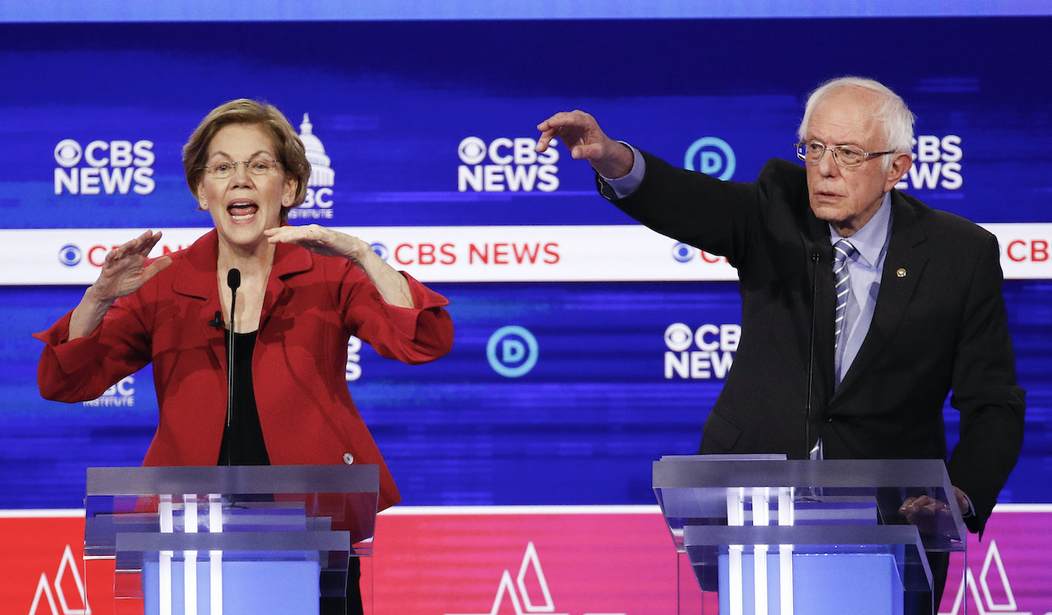What’s to blame for inflation? No one wants to talk about the real reasons — chronic and increasing deficit spending, massive expansions of monetary supply, plus the catalysts of over-stimulation and supply-chain breakdowns. That would spread the blame too widely around the Beltway. Instead, everyone has saddled up their favorite hobby horses and want to ride them until they drop, or at least until the midterms.
The Washington Post’s David Lynch yanked back the reins on progressives’ hobby horse yesterday. Corporate greed didn’t cause inflation, and so-called windfall profits are a myth:
But “greed,” by itself, is a poor explanation for rising prices, according to investors, executives and many economists. After all, CEOs presumably were just as thirsty for profits during the decade before the coronavirus pandemic when most were unable to raise prices without driving customers away and annual inflation averaged less than 2 percent.
In practice, “corporate greed” is really shorthand for a sweeping critique of contemporary American capitalism, reflecting objections to the degree of competition in the U.S. economy, the priority afforded shareholders and the riches lavished on CEOs, according to economists on both sides of the debate. …
Where corporate critics see unrestrained greed and exploitation of vulnerable consumers, however, business-friendly Democrats detect the unremarkable workings of supply and demand.
One particular Democrat openly scoffs at that characterization. Jason Furman led the Obama administration’s economic team and tells Lynch that the “corporate greed” is sheer demagoguery:
“In a trivial sense, it’s true that businesses set prices to maximize their profits. They also choose wages and the level of employment to maximize profits,” said Jason Furman, President Barack Obama’s top economic adviser, who called complaints about corporate greed “just political ranting.”
Lynch also provides some data to show that charges of profiteering are unfounded:
Corporations banked a near-record $2.7 trillion in after-tax profits during the fourth quarter of 2021, almost twice as much as in the same period in 2009. But the average operating profit margin for companies in the S&P 500 index — how much is earned from each additional dollar of revenue — peaked in the middle of last year and is now 12.7 percent, about unchanged from 2018, according to Yardeni Research.
This topic in particular is sensitive to demagoguery. Progressive activists and officeholders loooove to talk about gross profits rather than net profit margin, which is what actually matters. Profit margin is the percentage left from gross revenues after accounting for all costs — payroll, taxes, materials, distribution, etc. If a company gets $10 billion in gross revenues and spends $9 billion to make it, they have a billion dollars of profit but a net profit margin of 10%. That’s their return on investment in a general sense, and what motivates people to buy stock. A 12.7% profit margin is pretty good overall, but it’s not profiteering, nor is it necessarily all that unusual, as Lynch demonstrates. Companies that end up in the S&P 500 generally outperform others in their industry (which is how they get on that listing in the first place), so we’d expect to see better performance in the margin.
Now let’s look at that average profit margins in a specific industry that frequently gets accused of profiteering. The annual net margin in the oil and gas industry was under 5% in 2021, according to an industry analysis by CSI Markets. (It was even lower in the preceding three years.) This industry makes tens of billions in profit each year, but that’s off of hundreds of billions in revenue and almost as much in costs. Inflation hits their bottom line as well, especially on buying/producing raw materials (crude), distribution, refining, and so on. Their margin is likely to improve this year, but it’s not likely to do a whole lot better.
This shows why progressives’ proposals to deal with inflation will backfire. Higher corporate taxes based on the idea that windfall profits exist will instead escalate costs on normal market profits. That will only make inflation worse by forcing corporations to pass the costs of those taxes onto consumers. To the extent that they eat those costs, corporations will have to either trim jobs or curtail R&D work that helps to create economic expansion.
The best way to address inflation is to reduce the necessity for monetary supply expansions by ending deficit spending and require a balanced budget overall. That would take a massive reform of entitlement programs plus tax increases over the long haul, something neither party will support. In the short term, we could massively expand domestic energy production to lower oil prices and at least relieve the supply issue that most contributes to systemic inflation. Instead, they’re both looking to the Fed to choke the economy long enough to create a mild recession so that they can kick the real can down the road a bit longer while demonizing their respective betes noires.








Join the conversation as a VIP Member